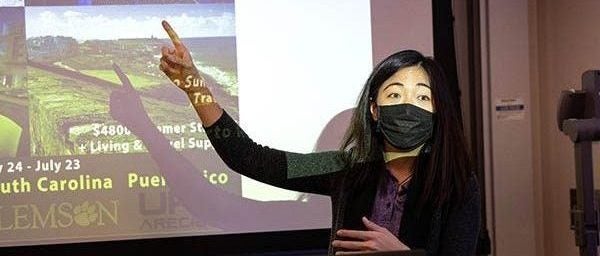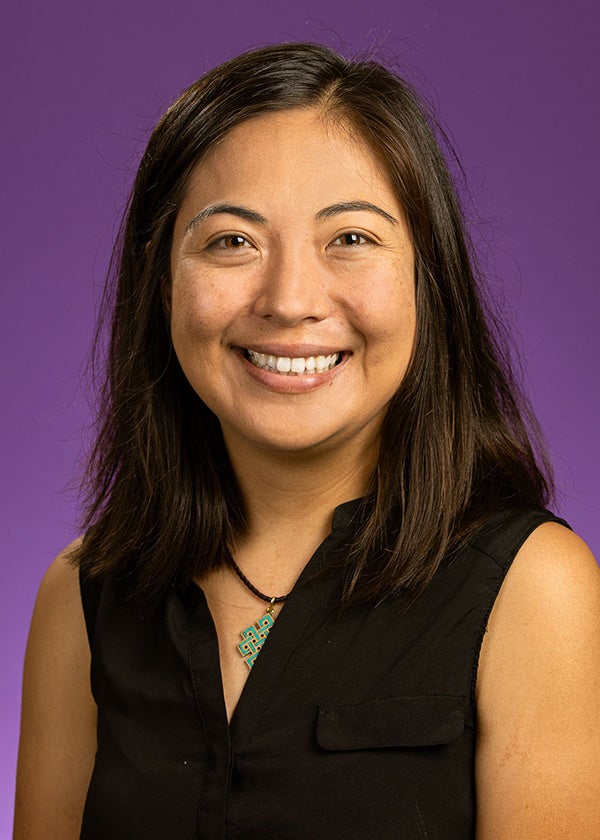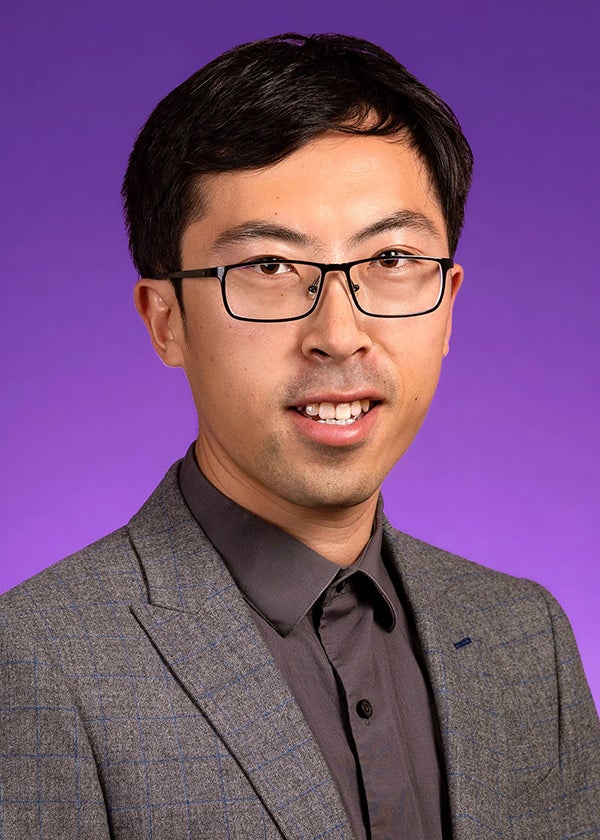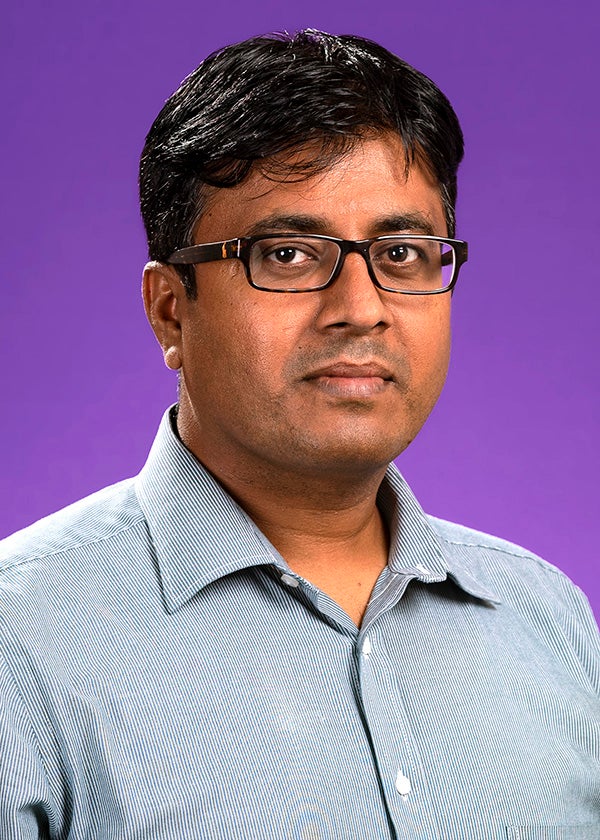Three engineering professors, including the first woman at ECU, pass prestigious exam

Dr. Natasha Bell is the first woman faculty member in the Department of Engineering to pass the prestigious Principles and Practice of Engineering exam. (Photo by Rhett Butler)
Three faculty members in the Department of Engineering recently passed the prestigious Principles and Practice of Engineering (PE) exam, including the first female professor in the department to do so.
Drs. Natasha Bell, Shanyue Guan and Surganga Gunerathne join the ranks of four others in the department with their PEs, including Drs. Randall Etheridge, Hayden Griffin Jr., Ed Howard and John Reis.
Administered through the National Council of Examiners for Engineers, the advanced professional licensure exam tests competency in various engineering disciplines.
Natasha Bell

Dr. Natasha Bell
Teaching at ECU for a year and a half, Bell becomes the first woman faculty member in the Department of Engineering to successfully complete the PE exam.
“This is one of the most significant accomplishments of my professional life,” Bell said. “After all, the odds of me getting to this point were slim. Only about 20% of engineering graduates are women, and women make up only about 15% of professional engineers. As a first-generation college graduate, daughter of an immigrant and woman engineer, I hope this accomplishment serves to inspire others who are underrepresented in the field to pursue engineering careers.”
With a background in agricultural and biological engineering, Bell’s exam was on agricultural engineering.
“Attaining the PE was the logical next step in my career development and reflects my commitment to the field,” Bell said. “PE licensure will allow me to officially authorize engineering designs, which will likely come in handy since a large part of my research focus is on the design of nature-based solutions to remediate waterborne contaminants. I also hope to serve as a resource to ECU engineering students as they prepare for the FE (Fundamentals of Engineering) and PE exams, and eventual licensure.”
Bell said she dusted off some old textbooks and spent most nights and weekends studying for the exam. She credited her partner John and her instructors in high school and college, as well as mentors in the department, including Etheridge and Dr. Barbara Muller-Borer, the first woman chair of ECU’s Department of Engineering.
“I feel very fortunate to be part of such a supportive and positive working environment at ECU,” she said.
Bell said passing the test when she did proved important.
“The day after taking the exam, I awoke to intense abdominal pain that was getting worse by the hour,” Bell said. “After spending the day at the emergency room, it turned out I needed to get my appendix out. I’m just glad my appendix waited until after the exam to let me know.”
Shanyue Guan

Dr. Shanyue Guan
The assistant professor said he wanted to complete the PE in structural engineering because the experience he gains in designing buildings or bridges will help his students, the next generation of engineers.
“In the civil engineering field, people really care about practical experience,” said Guan, who’s been at ECU for three years. “Becoming a professional engineer will help me get involved with more projects. One of my research projects at ECU is funded by the NCDOT (Department of Transportation). With the help of the PE license, I am expecting more research opportunities with NCDOT in the future. In addition, Greenville and RTP (Research Triangle Park) are developing rapidly. I am envisioning more opportunities with some industry companies. I will also share this news with students in my class and encourage more students to become professional engineers.”
Guan said his preparation for the exam started five months before the test, including an intense push in the final two months.
“I used my own materials and borrowed some materials from my colleagues to prepare for the test,” he said. “My colleagues also gave me a lot of suggestions about preparing for the test. I am glad all the efforts paid off.”
He took the test in October in a large room with others spaced out due to COVID-19 requirements. With all the design codes required for the test, Guan said he carried two suitcases of reference books with him to the exam.
“Honestly, this is one of the most stressful tests I have taken. I thought my Ph.D. qualifying exam was the most difficult one before I took this one,” he said.
Guan thanked his family, colleagues and department faculty for all of their support.
“This is only the first step,” he said. “My PE license will provide me more opportunities. I think to become a better engineer, I need to practice my skills on more projects.”

Dr. Surganga Gunerathne
Surganga Gunerathne
An assistant professor, Gunerathne passed his PE exam in civil engineering, with a concentration in geotechnical engineering.
“I love my profession as an engineer,” he said. “While being in academia, I wanted to stay connected with the engineering industry for continued professional development. A PE license makes you responsible and independent. It gives you a value and a name in your field of specialization that grants you recognition among your peers both in academia and in industry.”
Gunerathne, who is entering his fourth year teaching at ECU, said preparing for the test while juggling teaching and personal responsibilities was not easy. He made a plan that included two- or three-hour daily study blocks, spending more time on review and practice problems than new material.
“Some questions in my discipline heavily require engineering judgment,” he said. “My industrial experience helped when answering those judgmental questions.”
He said the eight hours spent taking the test were stressful but called passage of the test meaningful.
“I obtained the most prominent educational qualification an engineer can have,” said Gunerathne, who is also licensed in Texas. “The PE license brought me another step closer to my career goal, which is becoming a renowned person among the others in my area of specialization.”
And he knows what it means for his career and his students.
“Industrial collaborations open new opportunities for research and development,” he said. “It gives you an added respect and importance among students and colleagues. At ECU engineering, I teach and mentor future engineers. I share my experience and expertise with my students. It motivates them. They expect and respect my guidance more due to my added credential as a PE. I can help students find internships and job opportunities. Together, we become stronger as a department.”